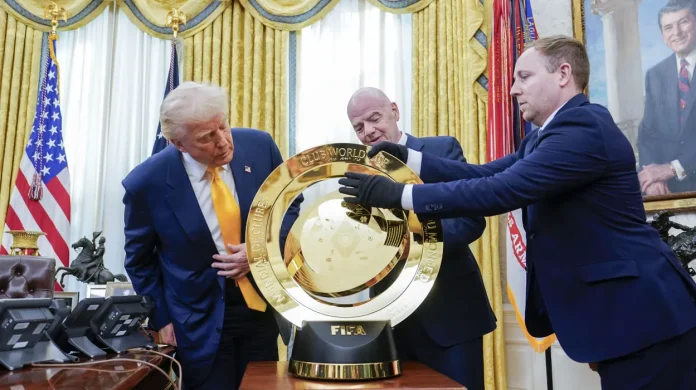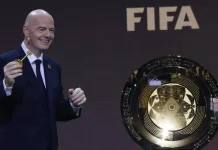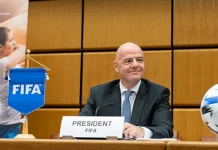With the 2026 FIFA World Cup looming, the tournament is set to be not only a sports extravaganza but also a stage for political theatre, with no less than former U.S. President Donald Trump being the star of the show.
Trump told the Oval Office in August 2025 that the FIFA World Cup draw would be held at Washington, D.C.’s Kennedy Center and dramatically promised to “put on shorts” to participate in soccer matches. Although said jokingly, his comments have contributed to concern over the politicization of a global sporting event.
The World Cup, to be co-hosted by the United States, Canada, and Mexico, is set to be the biggest one yet, with 48 teams, generating over $47 billion in economic output and up to 290,000 jobs in the United States. However, Trump’s direct involvement and his branding of cultural institutions as extensions of his persona are indicative of a breaking down of distinctions between political spectacle, government, and sport. The circus of these theatrics risks eclipsing basic operational and fan-centric necessities.
Political optics overshadowing sporting priorities
Trump’s involvement, from his reneging on returning the FIFA World Cup trophy to his self-interested statements on the Kennedy Center renovation, has redirected attention from logistical imperatives. Operational management–from site preparation and security coordination to fan services across 16 host cities–demands singular focus that political theatre can detract from.
FIFA President Gianni Infantino’s highly public embracing of Trump’s visibility and declarations of “great friendship” illustrate FIFA’s embrace of top-level political alliances. Politically convenient as it is, the approach questions the organization’s ability to have operational autonomy and that the World Cup experience is not transformed into more spectacle than football.
The challenge for FIFA’s organizational credibility
The FIFA World Cup is immensely popular, but its increased size in 2026 requires diligent planning of logistics, security, and infrastructure. The Kennedy Center draw, outside of any host city, symbolizes the ceremonial rather than practical nature of such events. Specialists opine that the focus on political theater rather than technical planning can divert energy from critical operational responsibilities, which can affect the overall quality and safety of the tournament.
Global and local expectations versus political interference
Fans, federations and stakeholders anticipate transparency, equitable treatment of guests, and strong security. Concerns for inclusion for African and other historically marginalised fans intersect with increasing distrust of political entanglement. FIFA’s association with someone as divisive as Trump can be harmful to trust, leaving questions about the organization’s neutrality and protection for all fans.
The issue is a balance between political leaders’ profile and role and the organizational and moral imperatives of hosting an international sporting event. Mismatch risks both alienating key constituencies and tarnishing FIFA’s image in the international community.
Wider lessons and implications for FIFA governance
Mega sports events have long been exploited for wider political agendas, and FIFA is no stranger to such forces. Yet the 2026 example highlights how political polarization in our current era can amplify reputational risk. Public opinion increasingly conflates political spectacle with organizational competence, suggesting that governance breakdowns can have amplified consequences.
Accountability, transparency, and operational risk
Political spectacle has the ability to obscure accountability and transparent decision-making. Ensuring that infrastructure, safety, and fan services meet global expectations requires that FIFA mitigate distractions introduced by high-profile political involvement. The organization’s credibility hinges on demonstrating that operational excellence is not compromised by performative alliances or media spectacles.
This person has spoken on the topic, highlighting concerns about how political theater linked to football mega-events can eclipse their sporting and cultural potential:
🚨 LMAO! A reporter just asked if President Trump is going to take part in FIFA events, and he gave the most Trump answer ever
POTUS: “I may play… I look EXTREMELY good in shorts” 🤣
“I see the money these players are making! I’m a very good athlete.” pic.twitter.com/nNXznwrmlP
— Nick Sortor (@nicksortor) August 22, 2025
Strategic foresight for large-scale events
For FIFA, 2026 represents an opportunity to reframe its political involvement, governance approach, and public relations. Political support can increase visibility and strength, but must be handled sensitively so that it enhances, not undermines, the core mission of the organization: delivering a safe, equitable, and world-bonding football experience. Missteps can affect stakeholders’ views of FIFA’s integrity and credibility of future tournaments.
The intersection of international sport and politics in 2025 offers a lesson to the sporting organizations that organize high-stakes international competitions. As the world prepares for the expanded 48-team World Cup, the balance between substance and spectacle will not only decide the short-term success of the tournament but the overall reputation of football as a unifying global cultural force. How effectively FIFA handles these forces will decide if the 2026 World Cup is remembered for sporting excellence or for the spectre of political spectacle.












